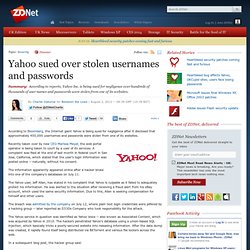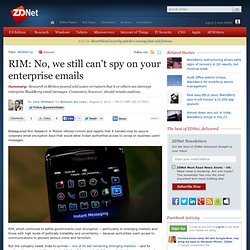

Topical ReTweets. Yahoo sued over stolen usernames and passwords. According to Bloomberg, the Internet giant Yahoo is being sued for negligence after it disclosed that approximately 450,000 usernames and passwords were stolen from one of its websites.

Recently taken over by new CEO Marissa Meyer, the web portal operator is being taken to court by a user of its services. A complaint was filed at the end of last month in federal court in San Jose, California, which stated that the user's login information was posted online -- naturally, without his consent. The information apparently appeared online after a hacker broke into one of the company's databases on July 11. The Yahoo user, Jeff Allan, has stated in his complaint that Yahoo is culpable as it failed to adequately protect his information. RIM: No, we still can't spy on your enterprise emails. Beleaguered firm Research in Motion refuted rumors and reports that it handed over its secure corporate email encryption keys that would allow Indian authorities access to snoop on business users' messages.

RIM, which continues to battle governments over encryption -- particularly in emerging markets and those with high levels of politically instability and uncertainty -- because authorities want access to communications to prevent serious crime and terrorism. But the company needs India to survive -- one of its last remaining emerging markets -- and its continued expansion in the region is risked on false reports that its security has been compromised. The mobile firm said it denied the allegations and sought to correct "false and misleading information.
" The wording next, however, is interesting. Using homegrown tech to quell cyberespionage can backfire. Governments that choose to use only locally developed technology as a way to eliminate foreign cyberespionage must realize the tradeoffs in doing so, and should consider other ways to allay such worries.

Ng Kai Koon, senior manager for legal and public affairs at Symantec Asia-Pacific, noted that in the ever-changing techology landscape, keeping pace with cybersecurity is a continuous challenge even for established market players such as Symantec. Countries that decide to build their own technology from scratch need to be aware they may not be able to provide the best security environment, at a cost-effective price, for its citizens or government agencies, said Ng. Webroot's big cloud gamble. Live Video - C-SPAN2.